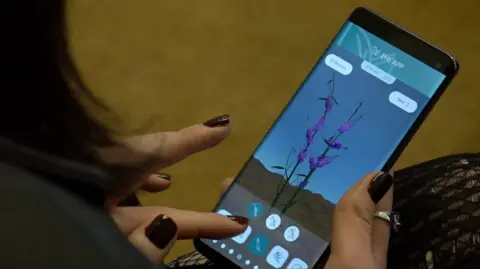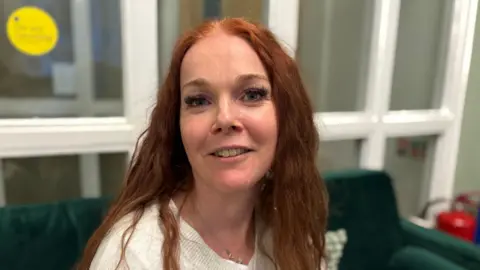Teens test virtual technology aimed at helping anxiety
 BBC
BBCTherapy which uses virtual technology is being tested as a means of supporting teenagers with anxiety and those who struggle to attend school.
Cardiff Youth Service, part of Cardiff council's education department, has helped to test and develop a mobile app which uses augmented reality (AR) as an intervention for anxiety and social isolation.
Initial findings suggest the technology, which will be piloted in some schools in Cardiff and Swansea, has resulted in an "increase in social connection" and reduced levels of anxiety.
The Children's Commissioner for Wales said any intervention which could engage young people and help their emotional wellbeing was to be welcomed.
AR is an interactive experience where your real-world environment is augmented, added to or enhanced using computer generated content.
Counsellor Angela Mcmillan, who developed the AR therapy app, said the idea came from support sessions with young people in the south Wales valleys who had been struggling to attend school due to anxiety and social isolation.
"I'm really curious as to how we can use technology for good," she said.
"Instead of thinking of it as something we do by ourselves, how might we use technology where we are then able to share that with the person next to us?"
The app uses gaming technology to allow a young person to design a flower and choose a structure to support its growth and the weather conditions.
Users can then superimpose the digital images onto their physical surroundings using their device.

"What we found was young people were using the devices to move around their physical space but also interacting with each other in a playful way and we know that play is incredibly important for child development," said Ms Mcmillan.
A group of young people who are supported by Cardiff Youth Service were the first to test the AR app.
Lili, 16, said: "It's easy to use because you can separate it from yourself. It's easier to look at your emotions from an outside perspective.
"I think it could be helpful for a lot of people. If someone didn't really like talking then it can be like an ice breaker to open up conversations with their counsellor.
"I think it would be particularly useful for people with social anxiety."
Jonas, 15, said: "The thoughts of the day's experiences are going through my mind as I'm choosing the different things.
"It's creative and I've never seen something like this before."

It is hoped the technology will help certain individuals, particularly those who are neurodivergent, to feel more comfortable using images to express how they are feeling.
"We're just about to start some pilots in schools in Swansea and Cardiff. What we have seen so far in our initial pilots is an increase in social connection," said Ms Mcmillan.
"I think a key element of this is that if we feel a sense of belonging, that improves our wellbeing and the way we want to interact with the world.
"A by-product of that might be that young people want to go back into education or attend that in different ways."
The Children's Commissioner for Wales, Rocio Cifuentes, said school attendance remained "a big problem" as the number of children missing more than 10% of their schooling had doubled since the pandemic.
"There are multiple complex reasons for this, but we know emotional mental health and wellbeing does play a part and school anxiety is common," Ms Cifuentes said.
"I think it's really important to be considering any intervention which is evidence based and is showing to be effective but I also think it's important to listen to children and young people and what they need.
"The world is evolving, technology is evolving and I think where schools can use that technology effectively to support children and young people's attendance, that's to be welcomed."
Cardiff council said young people had "been given a voice and had valuable input in developing this tool which provides a way for them to communicate using an approach that they feel comfortable with".
